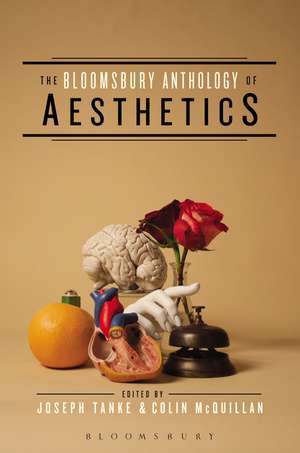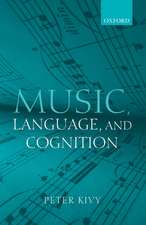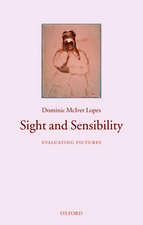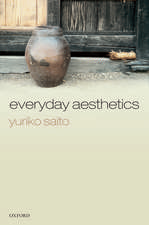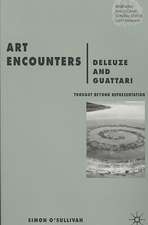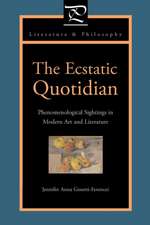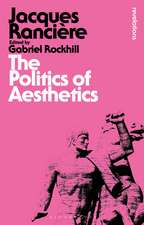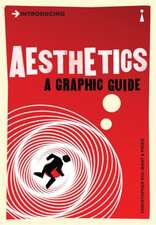The Bloomsbury Anthology of Aesthetics
Editat de Professor Joseph J. Tanke, Dr. Colin McQuillanen Limba Engleză Paperback – 3 oct 2012
Preț: 271.74 lei
Preț vechi: 320.70 lei
-15% Nou
Puncte Express: 408
Preț estimativ în valută:
52.01€ • 53.88$ • 43.40£
52.01€ • 53.88$ • 43.40£
Carte tipărită la comandă
Livrare economică 22 martie-05 aprilie
Preluare comenzi: 021 569.72.76
Specificații
ISBN-13: 9781441138262
ISBN-10: 1441138269
Pagini: 648
Dimensiuni: 156 x 235 x 46 mm
Greutate: 1.07 kg
Ediția:New.
Editura: Bloomsbury Publishing
Colecția Continuum
Locul publicării:New York, United States
ISBN-10: 1441138269
Pagini: 648
Dimensiuni: 156 x 235 x 46 mm
Greutate: 1.07 kg
Ediția:New.
Editura: Bloomsbury Publishing
Colecția Continuum
Locul publicării:New York, United States
Caracteristici
Interdisciplinary in design, it contains primary reading for philosophy, literature, and art courses.
Notă biografică
Joseph J. Tanke is based at the University of Hawaii. He has published and lectured extensively on issues in Continental philosophy, with a special emphasis on aesthetics and politics, as well as the works of Michel Foucault, Gilles Deleuze, and Jacques Rancière. Professor Tanke was recently named to the editorial board of Philosophy and Social Criticism, and his essays are currently being translated into two other languages. In addition to having studied philosophy in both the United States and Europe, Joseph holds a degree in art history and has worked for several art institutions.
Colin McQuillan is Lecturer in the Department of Philosophy at the University of Tennessee, USA. He has studied at the Univerzita Karlova in Prague, Czech Republic and the Martin-Luther-Universität in Halle (Saale), Germany, in addition to conducting archival research in Marburg, Göttingen, and Berlin, Germany.
Colin McQuillan is Lecturer in the Department of Philosophy at the University of Tennessee, USA. He has studied at the Univerzita Karlova in Prague, Czech Republic and the Martin-Luther-Universität in Halle (Saale), Germany, in addition to conducting archival research in Marburg, Göttingen, and Berlin, Germany.
Cuprins
General Introduction
Acknowledgements
I. Introduction to Ancient Aesthetics
1. Plato, Republic
2. Aristotle, Poetics
3. Plotinus, Enneads
4. Longinus, On the Sublime
II. Introduction to Medieval and Renaissance Aesthetics
5. Augustine, The Confessions
6. Pseudo-Dionysius, The Divine Names
7. Thomas Aquinas, Summa Theologica
8. Petrarch, On the Nature of Poetry
9. Giorgio Vasari, Lives of the Most Eminent Painters, Sculptors, and Architects
III. Introduction to Early Modern Aesthetics
10. Nicolas Boileau-Despréaux, The Art of Poetry
11. Jean-Baptiste DuBos, Critical Reflections on Poetry and Painting
12. Francis Hutcheson, An Inquiry into the Original of Our Ideas of Beauty and Virtue
13. Johann Christoph Gottsched, Critical Poetics
14. Charles Batteux, The Fine Arts
15. Alexander Gottlieb Baumgarten, Aesthetics
16. Edmund Burke, A Philosophical Enquiry into the Origin of Our Ideas of the Sublime and Beautiful
17. David Hume, Of the Standard of Taste
18. Gotthold Ephraim Lessing, Laocoön
19. Moses Mendelssohn, On the main principle of the fine arts and sciences
IV. Introduction to Modern Aesthetics
20. Immanuel Kant, Critique of Judgment
21. Friedrich Schiller, On the Aesthetic Education of Man
22. Schelling, Hegel, Hölderlin, Oldest Programme For a System of German Idealism
23. F. W. J. Schelling, System of Transcendental Idealism
24. Novalis, Miscellaneous Observations and Logical Fragments
25. G. W. F. Hegel, Lectures on the Philosophy of Art
26. Arthur Schopenhauer, The World as Will and Representation
27. Friedrich Nietzsche, The Birth of Tragedy
28. Friedrich Nietzsche, The Will to Power as Art
29. Charles Baudelaire, "The Dandy," from The Painter of Modern Life
30. Martin Heidegger, The Origin of the Work of Art
31. Meyer Schapiro, The Still Life as Personal Object
32. Paul Valéry, The Idea of Art
33. Walter Benjamin, The Work of Art in the Age of Its Technological Reproducibility
34. Clement Greenberg, Avant-Garde and Kitsch
35. Herbert Marcuse, The Aesthetic Dimension
36. Maurice Merleau-Ponty, Eye and Mind
V. Introduction to Contemporary Aesthetics
37. Michel Foucault, This is not a Pipe
38. Jacques Derrida, Restitutions
39. Jean-Luc Nancy, The Image-the Distinct
40. Cornel West, The New Politics of Cultural Difference
41. Jean-François Lyotard, The Sublime and the Avant-Garde
42. Arthur Danto, Three Decades After the End of Art
43. Alexander Nehamas, An Essay on Beauty and Judgment
44. Christine Battersby, The Male Gift
45. Rita Felski, Why Feminsim Doesn't Need an Aesthetic (And Why It Can't Ignore Aesthetics)
46. Laura Mulvey, Visual Pleasure and Narrative Cinema
47. Gilles Deleuze and Félix Guattari, Percept, Affect, and Concept
48. Alain Badiou, Art and Philosophy
49. Jacques Rancière, The Aesthetic Revolution and Its Outcomes
Acknowledgements
I. Introduction to Ancient Aesthetics
1. Plato, Republic
2. Aristotle, Poetics
3. Plotinus, Enneads
4. Longinus, On the Sublime
II. Introduction to Medieval and Renaissance Aesthetics
5. Augustine, The Confessions
6. Pseudo-Dionysius, The Divine Names
7. Thomas Aquinas, Summa Theologica
8. Petrarch, On the Nature of Poetry
9. Giorgio Vasari, Lives of the Most Eminent Painters, Sculptors, and Architects
III. Introduction to Early Modern Aesthetics
10. Nicolas Boileau-Despréaux, The Art of Poetry
11. Jean-Baptiste DuBos, Critical Reflections on Poetry and Painting
12. Francis Hutcheson, An Inquiry into the Original of Our Ideas of Beauty and Virtue
13. Johann Christoph Gottsched, Critical Poetics
14. Charles Batteux, The Fine Arts
15. Alexander Gottlieb Baumgarten, Aesthetics
16. Edmund Burke, A Philosophical Enquiry into the Origin of Our Ideas of the Sublime and Beautiful
17. David Hume, Of the Standard of Taste
18. Gotthold Ephraim Lessing, Laocoön
19. Moses Mendelssohn, On the main principle of the fine arts and sciences
IV. Introduction to Modern Aesthetics
20. Immanuel Kant, Critique of Judgment
21. Friedrich Schiller, On the Aesthetic Education of Man
22. Schelling, Hegel, Hölderlin, Oldest Programme For a System of German Idealism
23. F. W. J. Schelling, System of Transcendental Idealism
24. Novalis, Miscellaneous Observations and Logical Fragments
25. G. W. F. Hegel, Lectures on the Philosophy of Art
26. Arthur Schopenhauer, The World as Will and Representation
27. Friedrich Nietzsche, The Birth of Tragedy
28. Friedrich Nietzsche, The Will to Power as Art
29. Charles Baudelaire, "The Dandy," from The Painter of Modern Life
30. Martin Heidegger, The Origin of the Work of Art
31. Meyer Schapiro, The Still Life as Personal Object
32. Paul Valéry, The Idea of Art
33. Walter Benjamin, The Work of Art in the Age of Its Technological Reproducibility
34. Clement Greenberg, Avant-Garde and Kitsch
35. Herbert Marcuse, The Aesthetic Dimension
36. Maurice Merleau-Ponty, Eye and Mind
V. Introduction to Contemporary Aesthetics
37. Michel Foucault, This is not a Pipe
38. Jacques Derrida, Restitutions
39. Jean-Luc Nancy, The Image-the Distinct
40. Cornel West, The New Politics of Cultural Difference
41. Jean-François Lyotard, The Sublime and the Avant-Garde
42. Arthur Danto, Three Decades After the End of Art
43. Alexander Nehamas, An Essay on Beauty and Judgment
44. Christine Battersby, The Male Gift
45. Rita Felski, Why Feminsim Doesn't Need an Aesthetic (And Why It Can't Ignore Aesthetics)
46. Laura Mulvey, Visual Pleasure and Narrative Cinema
47. Gilles Deleuze and Félix Guattari, Percept, Affect, and Concept
48. Alain Badiou, Art and Philosophy
49. Jacques Rancière, The Aesthetic Revolution and Its Outcomes
Recenzii
.the anthology is valuable; it not only presents a captivating account of the history of aesthetics, but also, as promised by the editors, 'redraws the picture of aesthetics' so that a richer landscape emerges. Summing Up: Recommended. Lower-division undergraduates through researchers/faculty; general readers.
This ambitious anthology on the aesthetics of Bloomsbury editions will preferably to PhD students of English who are seeking various writings on art, in a decidedly philosophical perspective, which means highly distinct from the art history or sociology of art.
This ambitious anthology on the aesthetics of Bloomsbury editions will preferably to PhD students of English who are seeking various writings on art, in a decidedly philosophical perspective, which means highly distinct from the art history or sociology of art.
Descriere
Drawing from ancient, medieval, modern, and contemporary sources, this textbook offers a comprehensive and systematic historical overview of aesthetic theory.
